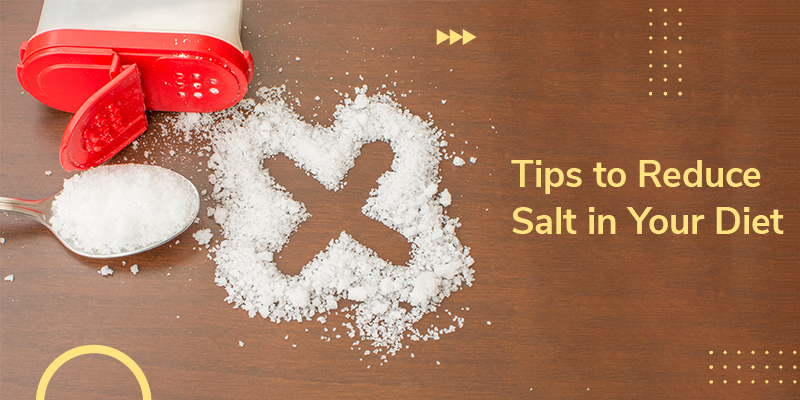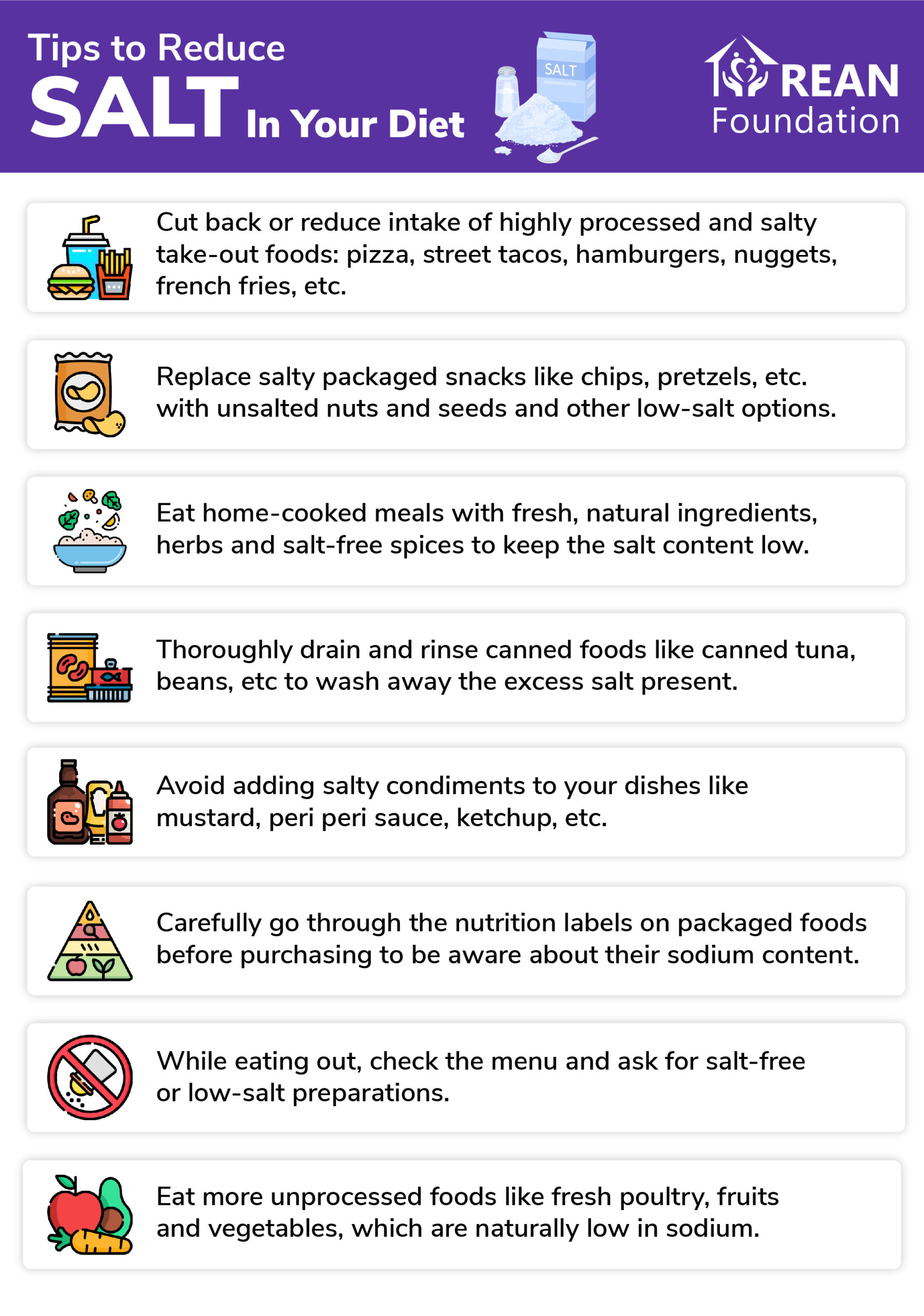
Why Is Excess Salt Bad For Health
Salt is a mineral that comes from two main sources: sea water and the sodium chloride mineral halite (also known as rock salt). It is composed of sodium chloride where about 40% is sodium and 60% is chloride. Sodium is an essential mineral that is required by the human body for optimal muscle and nerve function. Together with chloride, it also helps our body to maintain proper water and mineral balance. The salt taken by us as part of our food helps contract and relax muscles as well as lends a hand with nerve impulses. However, despite its essential functions, consuming too much salt can have ill effects on our body, both in the short and long term.
Nearly all natural, unprocessed foods like vegetables, fruits, whole grains, dairy products, nuts, meats -- are low in sodium. Our body needs only a small amount of sodium on a daily basis. World Health Organization (WHO) recommends that adults consume less than 5 g (just under a teaspoon) of salt per day whereas salt intake in India is about 11 g per day. Salt intake of less than 5 grams per day for adults helps to reduce blood pressure and risk of cardiovascular disease, stroke and coronary heart attack. The principal benefit of lowering salt intake is a corresponding reduction in high blood pressure.
Health Problems Caused By High Sodium Intake
Water Retention or Bloating
Many people might notice that their feet, face and tummy feel bloated or puffy after consuming high-sodium foods such as pizzas and other junk food items. The bloating happens because your kidneys hold more water to compensate for the extra sodium that has been consumed, and maintain a specific sodium-to-water ratio in the body. This increased water retention may result in swelling, especially in the hands and feet.
Increase in Blood Pressure
Dishes that are salt-rich can result in a larger volume of blood to flow through your blood vessels and arteries which may result in a temporary rise in blood pressure. However, every person’s sensitivity to salt is likely to be influenced by factors including his/her genetics and hormones. Also, factors like age and obesity may also play a role in increasing the blood pressure-raising effects of high salt food items.
Disturbed Sleep
Having too much salt in food before your bedtime can also cause disturbances in sleep that might vary from having a restless sleep, waking up often at night feeling thirsty and having an urge to drink water and not feeling well rested in the morning.
Regular high-salt consumption has many short-term effects but it can also cause many long-term health issues. It might raise your chances of things like frequent headaches, enlarged heart muscle, kidney disease, kidney stones, stomach cancer, heart failure, high blood pressure, osteoporosis, and stroke. Therefore, we all need to watch our diet to avoid suffering from ill effects of salty foods.
Also Read: Artificial Intelligence is Revolutionising Healthcare

Following a simple, fresh, heart-healthy diet can help prevent many health issues as well as help you better manage existing chronic conditions. A diet that is low in sodium, cholesterol, and saturated and total fats, and high in fruits and vegetables, fiber, potassium, and low-fat dairy products can help you stay healthy and active. You can use the REAN HealthGuru application to make healthy lifestyle changes, such as getting more physical activity and having a nutritious diet.
Salt is a mineral that comes from two main sources: sea water and the sodium chloride mineral halite (also known as rock salt). It is composed of sodium chloride where about 40% is sodium and 60% is chloride. Sodium is an essential mineral that is required by the human body for optimal muscle and nerve function. Together with chloride, it also helps our body to maintain proper water and mineral balance. The salt taken by us as part of our food helps contract and relax muscles as well as lends a hand with nerve impulses. However, despite its essential functions, consuming too much salt can have ill effects on our body, both in the short and long term.
Nearly all natural, unprocessed foods like vegetables, fruits, whole grains, dairy products, nuts, meats -- are low in sodium. Our body needs only a small amount of sodium on a daily basis. World Health Organization (WHO) recommends that adults consume less than 5 g (just under a teaspoon) of salt per day whereas salt intake in India is about 11 g per day. Salt intake of less than 5 grams per day for adults helps to reduce blood pressure and risk of cardiovascular disease, stroke and coronary heart attack. The principal benefit of lowering salt intake is a corresponding reduction in high blood pressure.
Health Problems Caused By High Sodium Intake
Water Retention or Bloating
Many people might notice that their feet, face and tummy feel bloated or puffy after consuming high-sodium foods such as pizzas and other junk food items. The bloating happens because your kidneys hold more water to compensate for the extra sodium that has been consumed, and maintain a specific sodium-to-water ratio in the body. This increased water retention may result in swelling, especially in the hands and feet.
Increase in Blood Pressure
Dishes that are salt-rich can result in a larger volume of blood to flow through your blood vessels and arteries which may result in a temporary rise in blood pressure. However, every person’s sensitivity to salt is likely to be influenced by factors including his/her genetics and hormones. Also, factors like age and obesity may also play a role in increasing the blood pressure-raising effects of high salt food items.
Disturbed Sleep
Having too much salt in food before your bedtime can also cause disturbances in sleep that might vary from having a restless sleep, waking up often at night feeling thirsty and having an urge to drink water and not feeling well rested in the morning.
Regular high-salt consumption has many short-term effects but it can also cause many long-term health issues. It might raise your chances of things like frequent headaches, enlarged heart muscle, kidney disease, kidney stones, stomach cancer, heart failure, high blood pressure, osteoporosis, and stroke. Therefore, we all need to watch our diet to avoid suffering from ill effects of salty foods.
Also Read: Artificial Intelligence is Revolutionising Healthcare

Following a simple, fresh, heart-healthy diet can help prevent many health issues as well as help you better manage existing chronic conditions. A diet that is low in sodium, cholesterol, and saturated and total fats, and high in fruits and vegetables, fiber, potassium, and low-fat dairy products can help you stay healthy and active. You can use the REAN HealthGuru application to make healthy lifestyle changes, such as getting more physical activity and having a nutritious diet.



